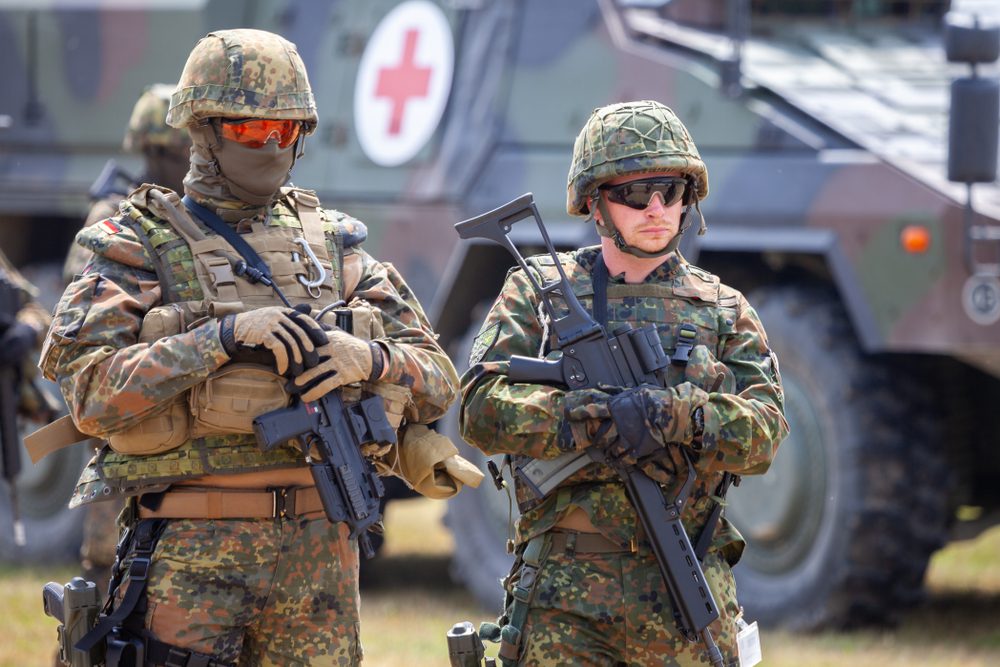
The German army’s ammunition depots are running dangerously low. Despite promises of a massive, €100 billion investment in the building of a powerful and state-of-the-art Bundeswehr after the Russo-Ukrainian war’s inception, hardly anything has been ordered. Now the Bundestag’s defense commissioner is getting involved.
In an interview with the Deutsche Presse-Agentur this weekend, Eva Högl voiced surprise at the fact that the extensive and urgent procurement of artillery shells, rockets, and other types of ammunition was not part of the €100 billion special fund for Germany’s armed forces. “Experts who have been dealing with ammunition for a little longer know about this enormous shortage,” she said.
To fill those gaps, Högl has proposed a fixed timetable for how tens of billions of euros will be spent solely on the procurement of new ammunition, Die Welt reported on December 4th. The plan should take a few years to finish, she said.
But for this to happen, the SPD politician recognises she first needs to get Germany’s weapons industry on board. Currently, these corporations are still hesitant to ramp up their production while iron-clad promises remain absent. An understandable concern, according to Högl, who stressed that:
We now need a roadmap, a coordinated approach which includes binding agreements with the defense industry on when what ammunition can be produced, where, and in what timeframe. That is the goal now, one which is preferably coordinated at the European level.
Recently, Chancellor Olaf Scholz (SPD) also admitted that Germany had set the “wrong course in recent decades when it comes to ammunition supply for the Bundeswehr.”
It remains curious that such an intervention by Högl was necessary in the first place, however.
The responsibility for supplying the Bundeswehr with enough ammunition should, after all, fall squarely on the shoulders of Defense Minister Christine Lambrecht (SPD).
With an exceedingly vital mandate and now ample funds to fill the empty depots (a situation admittedly exacerbated by their emptying to aid Ukraine), and nine months to do it in, Lambrecht however has not moved the needle much.
Indeed, so dire is the current state of affairs that, according to media reports, for some weapon systems, Germany may only have enough ammunition for a few hours of combat should war break out.
Critics of Lambrecht, who already cut an ineffectual figure and is no stranger to the occasional gaffe or controversy, now have one more arrow to draw from their quiver.
Indeed, both the opposition and members of Chancellor Olaf Scholz’s coalition are denouncing Lambrecht’s failure—which comes at a crucial moment, as Germany is attempting to position itself as Europe’s main security guarantor.
Lambrecht’s poor leadership was accentuated by what appeared to be her last-ditch attempt to stave off disaster. On November 29th, she had written to Finance Minister Christian Lindner, urging him to “immediately provide significant amounts of budget funds” for ammunition purchases.
Subsequently, a nonplussed Lindner (FDP) decided to let Politico see his ‘request denied’ letter written in response, which had been sent on his behalf by Finance State Secretary Steffen Saebisch.
Saebisch, again according to Politico, himself wrote that he “must state” that Lambrecht never mentioned the need for additional ammunition procurement during budget debates in the last [nine] months—a not too subtle dig at her inability to communicate effectively.
The state secretary went on to criticize Lambrecht’s lack of sensible organization. According to defense industry officials, he said, “the sluggish availability of ammunition and equipment … is not caused by a lack of budgetary funds, but by complicated, partly non-transparent and inconsistent planning and bureaucratic ordering processes.”
Members of Parliament from the Greens, an important coalition partner for Scholz, even went so far as to publish a joint press release the same day, saying that it had been long known that Germany is “far from meeting” the ammunition targets of the NATO military alliance—part of a pledge Scholz had made back in March that Germany would exceed the annual defense spending goal of 2% of GDP (expected of NATO members) after having been 0.5 percentage points below it.
“It is unclear why ammunition was not at the top of the Defense Ministry’s to-do list after [Russia’s invasion on] February 24th at the latest,” the joint release went on.
Trying to steady his rocky ship, Scholz then came to his defense minister’s aid, telling reporters that she was “very committed” to eliminating shortcomings in the army’s ammunition depots. “I can assure you: She is doing everything she can to ensure that this succeeds, and it will succeed,” he promised.
While Scholz’s loyalty to his fellow SPD-er is commendable, angering one’s own coalition partners can be kept up for only so long. Whether Lambrecht should stay or go has been a recurring question that has now become most pressing.
